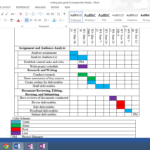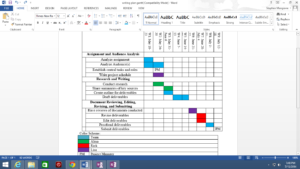Planning refers to
- a cluster of creative, analytical, strategic processes that writers engage in before beginning to write — aka prewriting
- the moments during the writing process (especially during invention, drafting, collaboration, research, planning, organizing, designing, rereading, revising) when a writer pauses and reengages in planning processes, questioning what they’ve said and what they need to do next.
- Writers may engage in planning throughout the composing process. They may pause from writing to contemplate how best to respond to a problem, an exigency — the specific call or problem that motivates their writing. For example, they may pause because a particular article, research study, or counterargument challenges their thesis or hypothesis, requiring a reevaluation of their message or writing plan. Thus, although planning is often defined as an initial stage of the writing process, in the real world it permeates and informs all acts of composing. In other words, planning is not just a preliminary stage but an ongoing activity that influences the entire composition process.
Interviews and case studies of writers @ work have found that writers engage in a variety of dispositions and strategies during prewriting:
Dispositions
- Openness to Experimentation
- During prewriting, writers engage in playful exploration of ideas. They don’t worry about organization or grammar or try to produce polished prose. Instead, their focus is on taking in information and letting it percolate in unexpected ways.
- As writers work their way through the writing process they may need to revise their plans for managing their time and writing the document. This requires a mindset of openness — a willingness to walk from a project that ill-conceived, a willingness to change one’s thesis as a project evolves.
- Openness to the Subconscious, Ambiguity, Intuition, Felt Sense, Non-Verbal Representations of Meaning
- During composing, writers may make plans for developing a document or revise their plans for managing their time based on a felt sense, an embodied sense, of what they’ve said versus what they’d hoped to say:
- “When writers are given a topic, the topic itself evokes a felt sense in them. This topic calls forth images, words, ideas, and vague fuzzy feelings that are anchored in the writer’s body. What is elicited, then, is not solely the product of a mind but of a mind alive in a living, sensing body…..When writers pause, when they go back and repeat key words, what they seem to be doing is waiting, paying attention to what is still vague and unclear. They are looking to their felt experience, and waiting for an image, a word, a phrase to emerge that captures the sense they embody….Usually, when they make the decision to write, it is after they have a dawning awareness that something has clicked, that they have enough of a sense that if they begin with a few words heading in a certain direction, words will continue to come which will allow them to flesh out the sense they have” (Perl 1980, p. 365).
- During composing, writers may make plans for developing a document or revise their plans for managing their time based on a felt sense, an embodied sense, of what they’ve said versus what they’d hoped to say:
Strategies – Examples of Planning Strategies
- Openness to the Subconscious, Ambiguity, and Felt Sense
- During composing, writers remain open to subconscious cues, embracing ambiguity and intuition. They pay attention to their felt sense—an embodied awareness of what they’ve expressed versus their initial intentions. Perl (1980) notes that this involves waiting for the emergence of an image, word, or phrase that captures the sense embodied by the writer, leading to a moment of clarity where writing begins to flow.
- During composing, writers remain open to subconscious cues, embracing ambiguity and intuition. They pay attention to their felt sense—an embodied awareness of what they’ve expressed versus their initial intentions. Perl (1980) notes that this involves waiting for the emergence of an image, word, or phrase that captures the sense embodied by the writer, leading to a moment of clarity where writing begins to flow.
- Strategic Planning
- For writers, strategic planning involves:
- setting specific goals for the writing piece and methodically organizing the steps to achieve them by deadline.
- identifying the necessary research steps you need to take understand to explore the topic and ensure ethical codes of conduct.
- For writers, strategic planning involves:
- Rhetorical Analysis, Research Methodology, and Ethics
- Writers analyze the rhetorical situation. They consider context, purpose, and discourse community norms. This includes identifying the current scholarly conversation on the subject, understanding the required research methodology, and adhering to ethical standards.
- Writers tailor their rhetorical stance, voice, tone, and persona in alignment with audience expectations and discourse conventions. This includes selecting the appropriate citation style and considering the use of citation management tools to streamline the process of tracking citations.
- Invention Strategies
- Writers may use heuristics to organize and stimulate their analysis of a topic.
- The term heuristic is derived from the Greek word heuresis, which means to discover or invent. Heuristics in contemporary discourse are exercises writers use to stimulate their thinking about a subject, topic. Heuristics do not predispose a particular outcome but are instead meant to serve as points of departure. There is no right and wrong way to conduct a heuristic.
- Writers may use heuristics such as freewriting, preliminary research, and visual brainstorming to engage in exploratory, divergent thinking about a topic.
- Writers use heuristics such as document planners, Burke’s Pentad, team charters, or templates to engage in convergent thinking.
- The term heuristic is derived from the Greek word heuresis, which means to discover or invent. Heuristics in contemporary discourse are exercises writers use to stimulate their thinking about a subject, topic. Heuristics do not predispose a particular outcome but are instead meant to serve as points of departure. There is no right and wrong way to conduct a heuristic.
- Writers may use heuristics to organize and stimulate their analysis of a topic.
- Research Strategies
- When an exigency, a call to write, is important to the writer, they may go beyond preliminary research to engaging in strategic research and reviewing scholarly conversations about a topic. Some writers prefer to read deeply into a topic before actually beginning to write.
- Adapting and Replanning Post-Draft
- Writers continually revise and adapt their initial plans based on new insights, feedback, or an evolving understanding of their topic. Throughout composing, writers pause to reflect on what they’ve said and what they’ve learn. They reassess their plans, often refining their arguments or pivoting to new arguments.
Synonyms
Related Concepts: Intellectual Openness; Invention; Mindset; Resilience; Self-Regulation & Metacognition
FAQs
Why Does Planning Matter?
- Aligning with Audience and Assignment Expectations
- For college students, planning involves carefully interpreting the assignment prompt to align with the instructor’s expectations and the intended audience. Similarly, professional writers must consider their target audience’s needs early in the process to avoid misdirection and inefficiency in their research and drafting efforts.
- Facilitates Reasoning and Learning
- Writing is an iterative process of reasoning and discovery. Writers pause throughout composing to reflect on what they’ve learned as a result of research writers engage in strategic research and learn more about their topics, their initial thesis, hypothesis, research question, their initial plans may need to evolve. This adaptability is essential because the writing process is a knowledge refine what they need next to communicate pe thesis and arguments in light of new insights, a principle that holds true for both academic and professional contexts.
- Organizes Complex Ideas
- Effective planning helps in structuring complex ideas, ensuring logical progression and clarity. This is crucial in academic essays and professional reports or proposals where coherent organization is key to effectively communicating complex information.
- Enhances Depth and Quality
- Thorough planning allows for a deeper exploration of topics, benefiting both students in academic research and professionals in fields that require detailed analysis and comprehensive reporting.
- Reduces Anxiety and Builds Confidence
- A clear plan reduces uncertainty, a benefit for students facing challenging assignments and professionals tackling demanding projects. It provides a sense of control and confidence in managing the writing task.
- Essential for Large-Scale Projects
- In both academic and workplace settings, complex or lengthy projects require meticulous planning to manage the scope and scale effectively.
- Improves Time Management
- Planning enables efficient use of time, a critical skill for students juggling multiple assignments and professionals meeting deadlines.
- Supports Adaptability in the Writing Process
- As understanding deepens or project requirements change, a flexible plan allows writers to adjust their approach, maintaining clarity and persuasiveness.
- Aids in Collaborative Efforts
- Planning is vital in team writing projects, common in both academic group assignments and professional collaborations, ensuring coordinated efforts and clear communication.
- Sets the Foundation for Targeted Revisions
- A well-structured plan aids in the revision process, allowing writers to compare their drafts against initial objectives and make focused improvements.
When, During Composing, Should Writers Engage in Planning?
The necessity of planning in the writing process varies among writers and depends on the specific rhetorical situation. While some scenarios are so familiar that they require little to no planning, allowing writers to immediately know what to say, other circumstances demand more thoughtful preparation.
Planning is traditionally seen as an initial step in writing, often associated with prewriting and including activities like rhetorical analysis. However, in reality, planning is a dynamic and continuous part of the writing process. Writers may find themselves revisiting and adjusting their plans at various stages of the writing process, especially during invention, drafting, collaboration, research, planning, organizing, designing, rereading, revising.
The extent of planning needed is largely dictated by the nature of the writing task. Extensive planning is more common when the task is unfamiliar, intricate, carries significant impact, or involves collaboration, whether face-to-face or online. In these cases, careful planning helps in organizing thoughts, aligning team efforts, and ensuring that the final message is coherent and effective. Conversely, for routine or straightforward writing tasks, extensive planning may not be necessary.
Understanding the specific demands of the rhetorical situation enables writers to determine the appropriate level of planning required. This flexibility in planning ensures that writers can effectively address the unique challenges and opportunities presented by each writing task.
What Is the Difference Between Planning, Prewriting & Invention?
The terms planning, prewriting, and invention may be used used interchangeably because they are such intertwined processes, yet they each carry distinct meanings:
- Planning typically refers to the overall process of organizing ideas and structuring a writing piece, encompassing the selection of topics, determination of purpose, and arrangement of content. It typically encompasses tools such as Team Charters and usage of project management software. While prewriting and invention may involve more creative and exploratory activities, planning is focused on setting a clear direction and framework for the writing.
- Prewriting is a subset of planning, focusing more on the initial stages of idea generation, brainstorming, and exploration of thoughts before formal writing begins. Prewriting is more expansive and free-form than planning, allowing for a broader exploration of thoughts and concepts. In comparison to invention, prewriting is less about generating new ideas and more about exploring and organizing existing ideas in preparation for writing.
- Invention in writing refers to the process of generating new ideas, concepts, or perspectives. Invention is distinct from planning and prewriting in that it is focused primarily on creating something new, rather than organizing or setting objectives for existing ideas.







